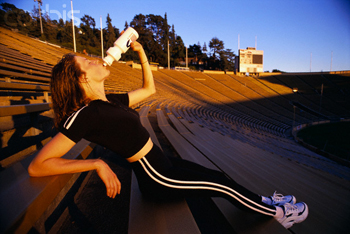Exercising in hot weather puts extra stress on your heart and lungs. Both the exercise itself and the air temperature increase your body temperature. To dissipate heat, more blood circulates through your skin. This leaves less blood for your muscles, which increases your heart rate. If the humidity is high, your body faces added stress because sweat doesn’t readily evaporate from your skin — which only pushes your body temperature higher.
Take it slow. If you’re used to exercising indoors or in cooler weather, take it easy at first. As your body adapts to the heat, gradually increase the length and intensity of your workouts. If you have a chronic medical condition or take medication, ask your doctor if you need to take additional precautions.
Drink plenty of fluids. Your body’s ability to sweat and cool down depends on adequate rehydration. Drink plenty of water while you’re working out — even if you don’t feel thirsty. If you’re planning to exercise intensely or for longer than one hour, consider sports drinks instead. These drinks can replace the sodium, chloride and potassium you lose through sweating. Avoid drinks that contain caffeine or alcohol, which actually promote fluid loss.
Dress appropriately. Lightweight, loosefitting clothing promotes sweat evaporation and cooling by letting more air pass over your body. Avoid dark colors, which can absorb the heat. A light-colored hat can limit your exposure to the sun.
Avoid midday sun. Exercise in the morning or evening — when it’s likely to be cooler outdoors — rather than the middle of the day. If possible, exercise in the shade or in a pool.
Wear sunscreen. A sunburn decreases your body’s ability to cool itself.
Have a backup plan. If you’re concerned about the heat or humidity, stay indoors. Work out at the gym, walk laps inside the mall or climb stairs inside an air-conditioned building.
Know when to call it quits
During hot-weather exercise, be on the lookout for heat-related illness. Signs and symptoms may include:
Weakness
Headache
Dizziness
Muscle cramps
Nausea or vomiting
Rapid heartbeat
If you suspect a heat-related illness, stop exercising and get out of the heat. Drink water, and wet and fan your skin. If you don’t feel better within 60 minutes, contact your doctor. If you develop a fever higher than 102 F (38.9 C) or become faint or confused, seek immediate medical help.
Regular physical activity is important — but don’t let hot-weather workouts put your health at risk.

